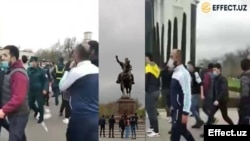Uzbekistan has opened a criminal investigation after a blogger who advocated for gay rights was beaten outside his Tashkent home.
Miraziz Bazarov was left hospitalized by Sunday's attack, in which three masked men, including one with a baseball bat, beat him.
Bazarov, known for his criticisms of the government and his social media commentary on corruption, was left with a broken leg, a concussion and internal bruising, according to Human Rights Watch.
The attack is believed to be connected to Bazarov’s defense of gay rights and calls for same-sex relationships to be decriminalized. Bazarov has said previously that he doesn’t view himself as a gay activist, but that he believes it is a personal issue that should not be regulated by law. The blogger said he had received threats previously for his commentary.
Consensual same-sex relations between men are criminalized in Uzbekistan, with prison terms of up to three years. As well as the risk of arrest, Uzbeks can face threats and extortion for their relationships.
Gay rights activists opposed
The attack on Bazarov came the same day that around 100 people held a rally against activism for gay rights in the capital.
Some reports said that the demonstration was organized in response to a gathering Sunday of fans of Japanese-style anime, some of whom were beaten by protesters. The Interior Ministry said the anime fans were suspected of being LGBTQ activists.
Security intervened in that case and 12 people were detained for initiating or taking part in the attack, according to Tashkent police.
The U.S. ambassador to Uzbekistan, Daniel Rosenblum, described the violence on Sunday as “disturbing” and called for the government to investigate the attack on Bazarov “who exercised his [freedom of expression] in support of the LGBTI community.”
The issue of gay rights in Uzbekistan has been debated in the wake of Human Rights Watch's call on the Uzbek government to decriminalize "homosexuality." Uzbekistan is debating reforms to the criminal code, but Article 120, which bans same-sex relationships, has not been updated, according to Human Rights Watch.
“Article 120, and abuses linked to it, has placed gay and bisexual men in Uzbekistan in a deeply vulnerable and marginalized position, leaving them with almost no protection from harassment by police and others,” Hugh Williamson of Human Rights Watch said in statement.
Williamson, director of the Europe and Central Asia division at the rights group, called on Uzbekistan to “definitively turn a page from its abusive past” and repeal the law.
Law defended
Some officials and members of parliament have defended the decision to retain the law against same-sex relationships.
Rasul Kusherbayev, a member of parliament, said sexuality had nothing to do with human rights, and Alisher Kadyrov of the Uzbekistan National Revival Democratic Party said the law should be amended to include "compulsory treatment, revocation of citizenship and expulsion from the country."
Komil Allamjonov, a former head of the Agency of Information and Mass Communication, released a video in which he said that the Muslim majority country “does not tolerate” or allow same-sex relationships.
The U.N. resident coordinator in Uzbekistan, Helena Fraser, described the events at the weekend as “disturbing” and said the U.N. condemned all forms of discrimination and violence against any person.
“The U.N. also condemns hate speech, which is an attack on tolerance, inclusion, diversity and the very essence of universal human rights norms and principles,” Fraser said in a statement, adding that Uzbekistan should investigate the attacks.
Fraser also called on the country’s media, bloggers and civil society to work together to counter violence rooted in hatred and all forms of discrimination.
This story originated in VOA's Uzbek Service.




